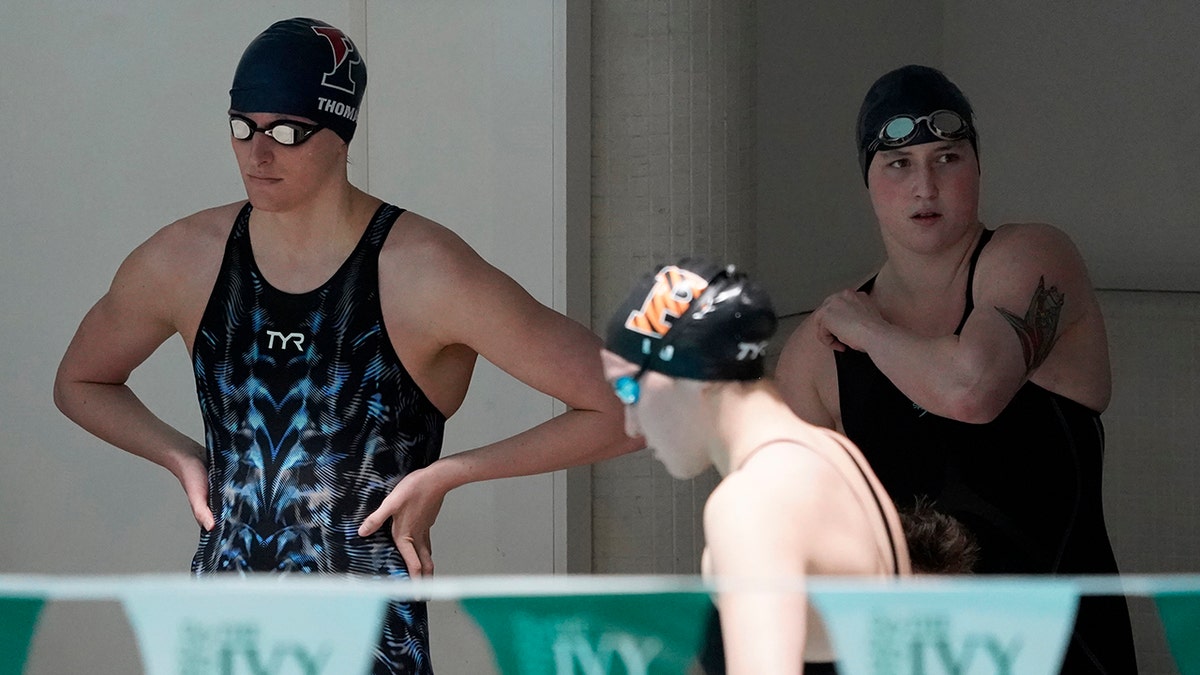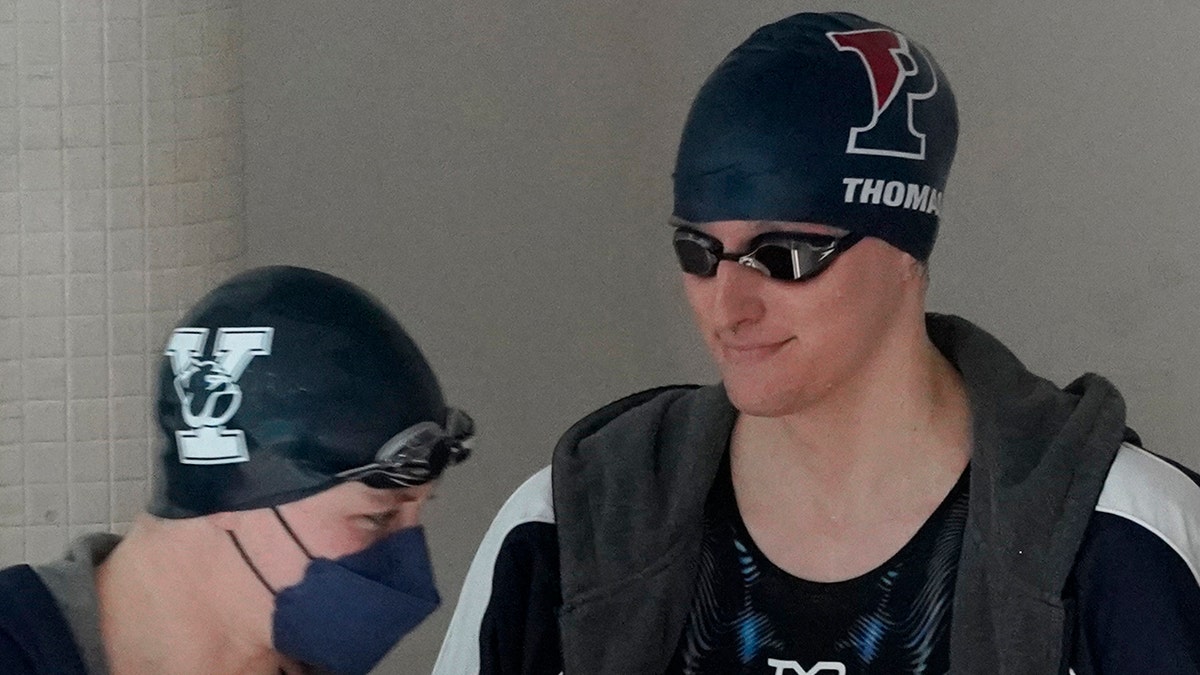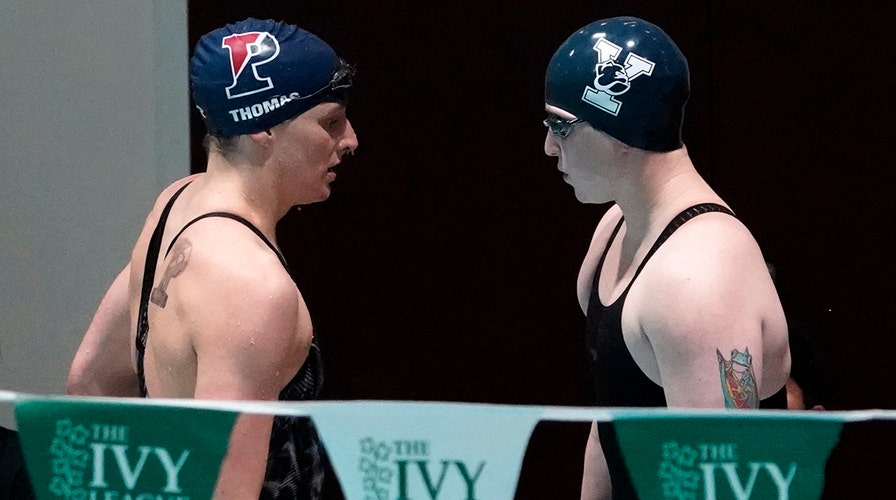Fox News Flash top headlines for February 19
Fox News Flash top headlines are here. Check out what's clicking on Foxnews.com.
Penn’s Lia Thomas narrowly beat out Yale’s Iszac Henig in the 100 free at the Ivy League Championship on Saturday night and set a new meet record in the event.
Thomas finished with a 47.63 mark while Henig finished with a 47.82 mark. Thomas’ mark is also a record for Blodgett Pool at Harvard University, where the meet was taking place.
CLICK HERE FOR MORE SPORTS COVERAGE ON FOXNEWS.COM

Penn's Lia Thomas, left, and Yale's Iszac Henig, right, prepare to swim in separate qualifying heats of the 100-yard freestyle at the Ivy League Women's Swimming and Diving Championships at Harvard University, Saturday, Feb. 19, 2022, in Cambridge, Mass. (AP Photo/Mary Schwalm)
Henig, who is transitioning from female to male and uses male pronouns, had some momentum going into the race. He had set a meet record in the preliminary race earlier Saturday and even topped Thomas. He had the lead in the first back and forth before Thomas turned on the jets.
It’s the third individual win for Thomas during the week.
Thomas raced in her first individual event Thursday and won convincingly.
The senior got off to a slow start in the 500 free and had to come back against Princeton’s Ellie Marquardt. But Thomas pulled away by the midpoint of the race. She finished in a time of 4:37:32 and took home first place.
On Friday night, Thomas set a record in the 200-yard freestyle competition on her way to another conference title. She finished in first place with a mark of 1:43.12, setting a record for the event and at Blodgett Pool.

Penn's Lia Thomas, left, leaves the pool deck as Yale's Iszac Henig, right, prepares to swim in a qualifying heat of the 100-yard freestyle at the Ivy League Women's Swimming and Diving Championships at Harvard University, Saturday, Feb. 19, 2022, in Cambridge, Mass. (AP Photo/Mary Schwalm)
The wins give Thomas some momentum going into the NCAA Championships.
There was some question over whether she would be able to compete given the debate over the NCAA’s recently updated transgender participation policy.
Last month, the governing body for college athletics announced its updated transgender participation policy, saying eligibility would be determined on a sport-by-sport basis. If there is no national governing body for the sport, then the NCAA sport will follow the International Olympic Committee’s (IOC) policy.
The NCAA said its policy would become effective March, starting with the Division I Women’s Swimming and Diving Championships, March 16-19.
On Feb. 1, USA Swimming updated its policy requiring transgender athletes who are competing at an elite level to have small levels of testosterone – half of what Thomas was allowed to compete with – for at least 36 months before being eligible. Thomas’ future in the pool was immediately uncertain.

Penn's Lia Thomas, right, smiles as Yale's Iszac Henig passes by as they prepare to swim in separate qualifying heats of the 100-yard freestyle at the Ivy League Women's Swimming and Diving Championships at Harvard University, Saturday, Feb. 19, 2022, in Cambridge, Mass. (AP Photo/Mary Schwalm)
However, the NCAA said last week the Administrative Subcommittee of the Committee on Competitive Safeguards and Medical Aspects of Sports (CMAS) decided that it wouldn’t alter its testosterone guidance after all, stating that "implementing additional changes at this time could have unfair and potentially detrimental impacts on schools and student-athletes intending to compete in 2022 NCAA women's swimming championships."
CLICK HERE TO GET THE FOX NEWS APP
The decision cleared the way for Thomas to compete in the NCAA Championships.











































